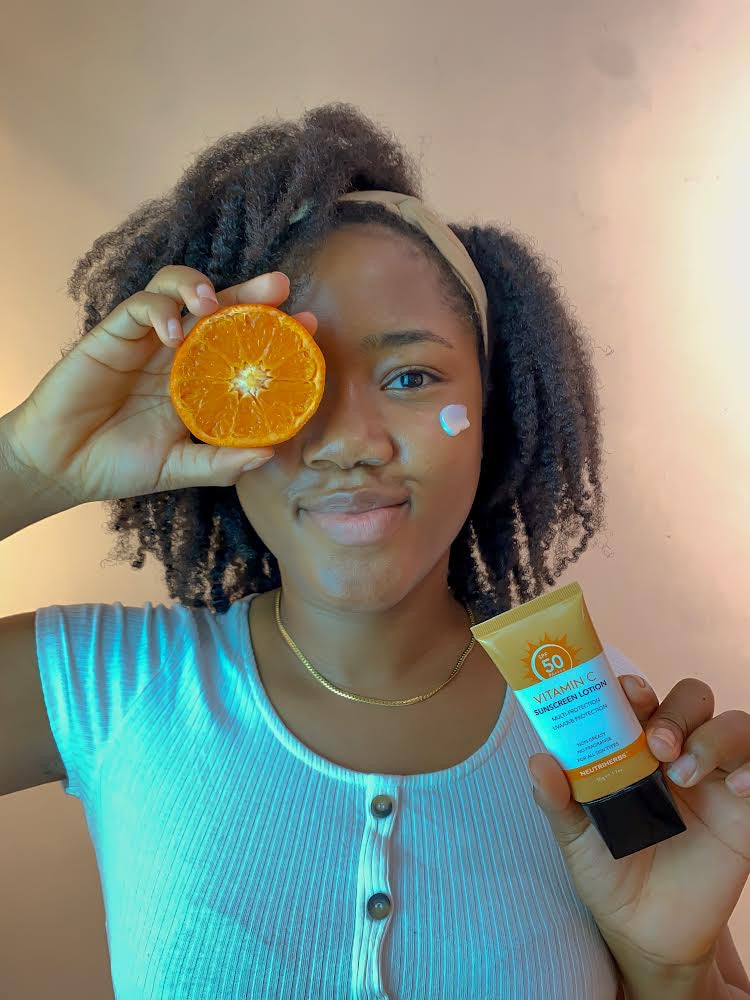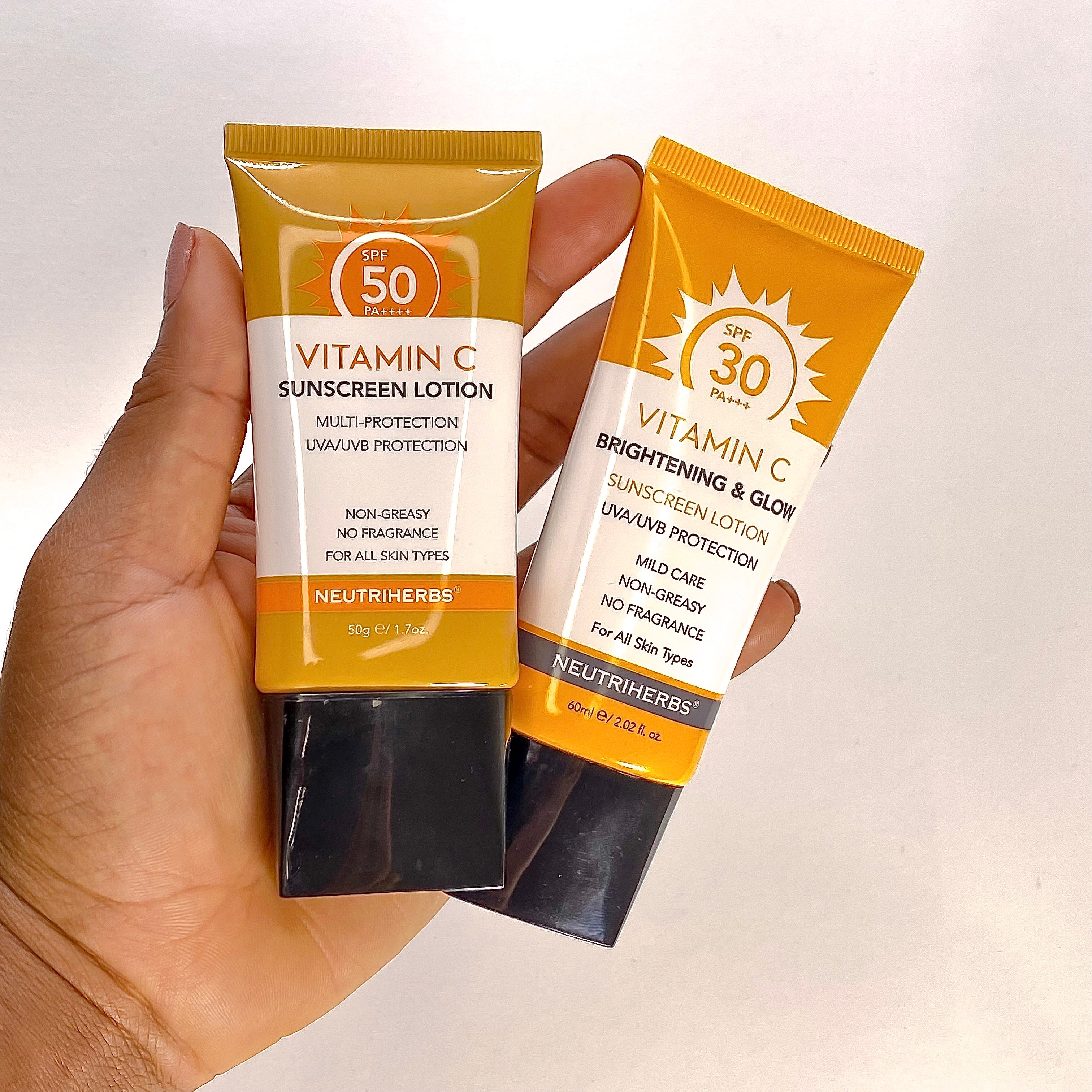
Should you choose a physical or chemical sunscreen?
Ask any certified derm or beautician or aesthecian. Sunscreens are the most important part of a daytime skin care routine. You can literally wash your face, pat them dry, apply sunscreen and you’re good to go.
So it makes perfect sense for you to learn as much as you can about this essential skincare, we all should have in our stash.
Sunscreen comes in three main forms—physical, chemical and hybrid, each offering sun protection to help defend against damaging UV rays, but with different methods to achieve it.
While physical sunscreens are usually gentler formulations, chemical sunscreens have their benefits too.
Ahead, Neutriherbs brings you its ultimate guide to picking between physical and chemical sunscreen.
What's the difference between physical and chemical sunscreen?
The critical difference between these types of sunscreens lies in how they block rays.
How Physical Sunscreens Work
Physical sunscreen, also known as mineral sunscreen, uses mineral-based UV filters like zinc oxide and titanium dioxide to help to reflect and scatter harmful rays from the sun. If the only active ingredients listed on your sunscreen’s label are zinc oxide and/or titanium dioxide, it’s a physical sunscreen.
Physical or mineral sunscreens sit on the surface of your skin and act as a shield
Physical Sunscreen tends to be heavier and can leave a whitish residue; this looks stark on Indian skin tones. Though it acts instantly, it needs to be reapplied frequently.
Physical sunscreen tends to be:
- Less irritating and a better fit for sensitive acne prone skin.
- Has thicker nature which makes it More moisturizing, which can feel heavy on the skin.
- Difficult to fully blend into the skin. However, newer brands now offer matte and tinted versions that have less of a white cast and can give the skin a smooth, even appearance.
- This form of SPF is also photostable, so it doesn’t need to be reapplied as often as a chemical sunscreen.
- These formulas are often recommended for children, pregnant women and people with sensitive or acne-prone skin. In addition to offering sun protection, zinc oxide has anti-inflammatory benefits that work well with reactive skin.
Who could avoid physical sunblock?
Colour match to the skin tone is the most significant concern in physical sunscreens. If you're worried about white cast then this type of sunscreen may not be for you. Outside this, physical sunscreens gets the job done excellently.
Who should use a physical sunscreen?
Anyone can use a physical sunblock as it tends to be less irritating. If adequate protection is your key priority then physical sunscreen offers the most broad-spectrum protection (against both UVA and UVB rays) and is widely recommended to prevent year-round UVA damage, including wrinkles, brown spots, and photoaging.
If you have sensitive, acne-prone, switching to physical sunblocks will improve your skin’s texture and appearance. Additionally, for kids and pregnant women mineral sunscreens are much safer formulations.
How Chemical Sunscreen Works!
While physical sunscreens work like a reflective barrier on skin’s surface and scatters UV rays, chemical sunscreens is a category of spf that uses active ingredients that acts like a sponge to absorb the sun rays, turn them into heat and then release through the skin.
Chemical sunscreens usually contains one or more of the following ingredients: oxybenzone, dioxybenzone, avobenzone, octocrylene, homosalate, octinoxate, ethylhexyl salicylate or octisalate, which absorbs and releases the damaging UV rays back into the environment.
If the active ingredients listed on your sunscreen’s label contain anything other than zinc oxide or titanium dioxide, it’s a chemical sunscreen (though some hybrid formulas contain both chemical and physical ingredients like the Neutriherbs SPF 30).
Chemical sunscreen is considered easier to apply as it does not leave behind the white residue often associated with physical sunscreens. Chemical formulations tend to be lighter and for that reason, are often preferred by oily and more resilient skin types.
Chemical sunscreen lasts longer but needs to be applied 20 mins before stepping into the sun
Who could avoid Chemical Sunscreens
The active ingredients in most chemical sunscreens can be fairly irritating so if you have sensitive or acne-prone skin you may want to use physical sunscreens instead.
Who Should Use Chemical Sunscreens
You should look for chemical sunscreen if you need a water-resistant formula. For instance, if you are going swimming or play sports or go out in the field at work or sweat a lot during the day, it’s better to use chemical sunscreen.
If you want an application that’s seamless and absorbs quickly in your morning skincare routine.
Are Neutriherbs Sunscreen Chemical or Physical?

Neutriherbs offers two types of sunscreen namely: Neutriherbs SPF 30 and Neutriherbs SPF 50.
Neutriherbs SPF 30

Enhance the natural radiance of your skin while helping to protect your complexion from the sun with Neutriherbs SPF30+ sunscreen. Ideal for daily use to hydrate and protect, leaving the skin looking glowing and well guarded.
So easy to use on the go, help to protect your skin without smudging your make-up.
Key Ingredients:
Zinc Oxide
Ethlyhexyl salicylate
Ascorbic Acid vitamin C
Verdict:
Neutriherbs SPF 30 is a hybrid sunscreen formula powered by zinc oxide that works by sitting on the skin and reflecting back UV rays. It's also made with chemical UV filter called Ethylhexyl salicylate and Enriched with wolfberry extract and vitamin C to brighten your skin’s appearance for a radiant look.
This means it has characteristics of both types of sunscreen. Which implies it shares some of the pros and cons of physical and chemical sunscreens.
Here’s what to expect from Neutriherbs spf 30 Hybrid Sunscreen:
- Gives 97% protection
- Hybrid sunscreen (chemical + physical)
- Contains Zinc oxide and ethlyhexyl salicylate
- Sits on skin and reflects sun rays
- May or May Not leave whitecast (Because of it’s hybrid nature there are mixed feedbacks some say no whitecast and a small number say it left whitecast)
- Perfect for sensitive and acne prone skin.
Neutriherbs SPF 50

Our newly upgraded Vitamin C Multi-protection Essence SPF 50 is a fast absorbing formula that helps protect your skin from early signs of premature aging and sunburn leaving you with a more luminous, younger and healthier complexion if you promise not to leave the house without it.
This super-fluid essence uses cleverly optimized broad-spectrum UVA/UVB filters to help protect you daily against damaging UV rays, that's not all - it's enriched with Vitamin c an antioxidant that fights dullness and beewax to create a protective layer on the skin.
Key Ingredients:
Beewax, Citric acid, Vitamin C, Homosalate, Ethylhexyl salicylate, Octocrylene
Verdicts:
Neutriherbs SPF 50 is a chemical sunscreen formula which means it acts like a sponge to absorb the sun rays, turn them into heat and then release through the skin so seamlessly in such a way that it looks invisible and makes skin feel comfortable and breathable.
What’s more? It’s non-greasy, won’t leave a white cast and doesn’t clog pores. Skin is simply left looking glowy, more even and ready for makeup (if that’s your thing).
What To Expect From Neutriherbs SPF 50
- Gives 98% protection
- Chemical sunscreen
- Contains homosalate, ethlyhexyl salicylate and octocrylene
- Absorbs UV rays and converts them to heat
- Minimum to No whitecast
Why You Should Try Neutriherbs sunscreen
Whether you choose our SPF 30 or SPF 50, there are several things why Neutriherbs sunscreen formula is worth a try:
- Broad spectrum (protects from both UVA and UVB rays)
- Fragrance-free
- Noncomedogenic (won’t clog pores)
- Oil-free
- Paraben-free
- SPF of at least 30 or higher
- Made with vitamin c for that radiant glow
Is physical Sunscreen Better Than Chemical Sunscreen?
Given the potential environmental impact and a few chemical sunscreen recalls here and there, physical sunscreens do tend to be more trusted across the board by dermatologist and top skincare experts whereas consumers are more drawn to chemical sunscreens because it leaves no whitecast. But with that being said, the "best" sunscreen is the one you will actually wear – whether 30 or 50, physical or chemical.

